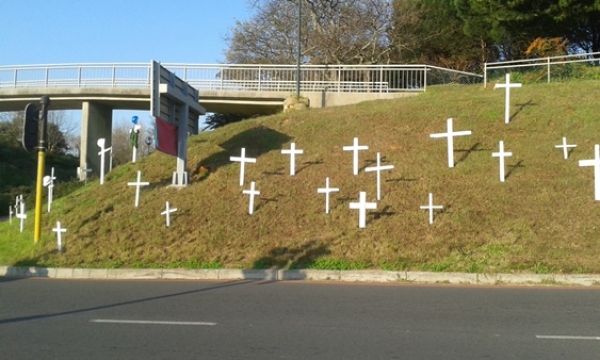

Crosses erected at Woolsack Drive to commemorate the Marikana massacre. Photo by Daneel Knoetze.
3 December 2014
The powerful International Finance Corporation has been sharply rapped over the knuckles in an ombudsman’s report on its US $50 million investment in Lonmin.
The investigation by the IFC’s independent Compliance Advisor Ombudsman was triggered by the killings at the Marikana platinum mine in August 2012. Reporting a year later, the ombudsman listed concerns with the IFC’s evaluation of environmental and social issues at Lonmin, particularly “industrial relations and worker security” issues, in the 18 months before the August killings.
But in the absence of a complaint from workers, the ombudsman said a link could not be established between these concerns and the deaths at Marikana and closed the case.
The IFC, which is the private sector arm of the World Bank, bought shares in Lonmin in 2007, in spite of opposition from some IFC executives who thought taking a stake in a publicly listed company was inappropriate. The IFC also extended a $100 million loan to Lonmin but that was never taken up.
IFC clients are required to have “appropriate” labour policies, to communicate directly with workers about working conditions, to respect collective bargaining agreements, to provide grievance mechanisms and to develop plans to minimise the effects of retrenchments.
But the ombudsman’s report suggests that the IFC failed to monitor Lonmin’s compliance with these and other requirements between 2007 and 2012. Among other things, the ombudsman raised concerns about:
the IFC’s response to Lonmin’s dismissal of 9,000 employees in 2011
the limited discussion between the IFC and Lonmin over worker-management relationships
the IFC’s response to the death of one employee and assault of five others on their way to work in April 2012
the adequacy of IFC reports after visits to Lonmin, especially since sections of some of the reports seemed to have been copied from previous years.
In general, it seems, neither the IFC evaluation teams nor the World Bank’s own evaluation team, which reported in June 2012, had much to say about employment issues at Lonmin in the run-up to the events in August.
After the killings, the IFC team “noted violence at Lonmin occurring in the context of increasing tensions between rival unions in the mining sector in South Africa, mines being shut down, worker lay-offs and declining workers’ bonuses”.
In December 2012, like almost all its other shareholders, the IFC took up additional shares in Lonmin through a rights issue (the offer of additional shares to existing shareholders in order to raise funds at a discount - in this case 45 % - to the ruling stock exchange price).
Lonmin said at the time that the US$817 million rights issue was necessary to help the company get back to “normalised” production, allow it to invest and reduce its debt. Without this money, Lonmin said, the company did not have enough working capital to cover 12 months of production.
Asked about the decision to invest more money in Lonmin so soon after the August 2012 killings, an IFC spokesman said the IFC had “addressed issues” with Lonmin and “supported its funding requirements to maintain operations in the wake of tragic events in 2012”.
“Support was intended to help all parties work toward solutions to issues that have affected an important national industry and more than 30,000 Lonmin workers, whose families have depended on income from their mines.”
“IFC encourages Lonmin and other parties to cooperate with the investigation of events of August 2012 through the Farlam Commission, which has not yet concluded its findings,” the spokesman said.
He said the IFC carefully considered the findings of the ombudsman “and draws lessons from them”.